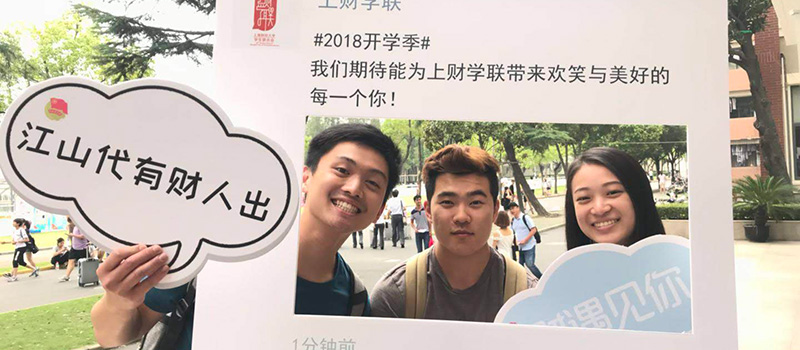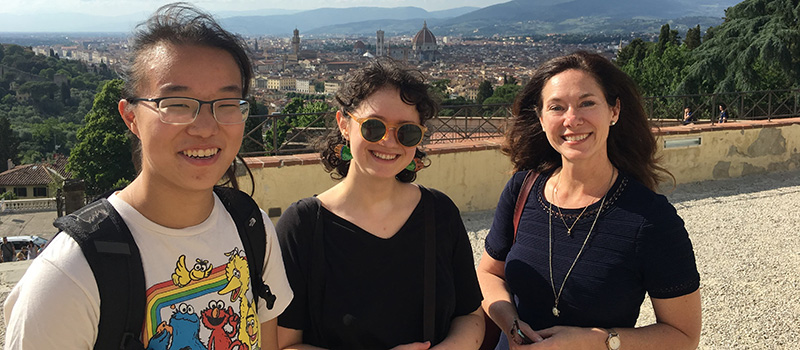
From Grinnell to everywhere
Bringing the world to students and students to the world
To an outsider, Grinnell College may appear to be another quaint, Midwestern school wedged between farmland and highway in a vast open landscape where students study and learn in isolation from the rest of the world.
But Grinnellians know that their campus is a remarkable hub to the rest of the world — one that emphasizes, promotes, and enables global experiences, connections, and opportunities.
“I find it very important to become a global citizen who is able to thrive in environments that may be foreign or unfamiliar,” says Samuel Chiang ’20. “As a child of Taiwanese immigrants, I have great pride in my heritage and culture. I think a global education is important because it prepares us to become active global citizens who are able to develop an appreciation for cultures different from our own as we build bridges of understanding that cross over boundaries, borders, and countries.”
When Chiang, who now is pursuing a master’s in biotechnology at Northwestern University, first began exploring undergraduate schools, affordability was one of his greatest concerns. He was unsure if he could afford an education that would provide him the wide range of global experiences he was looking for.
 Samuel Chiang ’20 poses within a cutout frame for Chinese social media.
Samuel Chiang ’20 poses within a cutout frame for Chinese social media.
“After being accepted to Grinnell, I was extremely grateful knowing that the College would cover a majority, if not all, of my tuition and living expenses,” he recalls. “With the generous financial aid from the College, I was able to pursue my passion in biology, study abroad in Shanghai, and pursue cutting-edge research across the country at renowned institutions like Northwestern and Michigan.”
As a biology major pursuing a career in medicine, studying abroad in Shanghai allowed Chiang to take classes in business and economics that were specific to China and expanding markets in Asia. This time allowed him to strengthen his Mandarin language skills and gave him the unique opportunity to intern at a local Chinese investment firm in its health care division.
“I have really come to cherish my experience abroad in Shanghai and am extremely grateful to have a network of friends and colleagues whom I keep in contact with even to this very day,” Chiang says.
Creativity within a Chinese major
Mira Berkson ’20 always knew she would study abroad. It was such an important goal that, if needed, she was willing to take on additional expenses, loans, and greater financial hardship to make it happen. There was always the worry, however, that doing so might compromise or minimize her global experiences.
When she became a Grinnellian, she learned that faculty and staff members shared her thoughts on the significance of global education and were willing to help her achieve her goals.
“I would have studied abroad regardless,” she says. “The financial assistance from Grinnell made it less stressful and really leveled the playing field for me. By going to Grinnell, I never questioned being able to study abroad.”
Berkson spent the 2018 fall semester studying abroad in Hangzhou, China. Grinnell covered the cost of airfare to China and extra expenses she had during the semester. And because Berkson’s tuition was covered by scholarships, she was also able to take advantage of summer opportunities that allowed her to explore interests that weren’t necessarily lucrative, but educational and informative.
 Brenda Guan ’20, left, Mira Berkson ’20, center, and education professor Cori Jakuibak pose for a group photo while traveling to Florence, Italy, for a research project.
Brenda Guan ’20, left, Mira Berkson ’20, center, and education professor Cori Jakuibak pose for a group photo while traveling to Florence, Italy, for a research project.
These summer opportunities included an internship at the National Conflict Resolution Center in San Diego, an internship fully funded by a scholarship from the class of 1962; a short-term research project in Florence, Italy, exploring linguistic tourism and language ideologies with Professor Cori Jakubiak; and a theatre and dance Mentored Advanced Project (MAP) in Taipei, Taiwan, with Professor Craig Quintero.
“As a Chinese major, I was thankful to see my interests collide and to collaborate with working artists,” she says. “So often, people hear about my Chinese major and assume I want to do something with business, so it was great to really be able to see myself using my degree more creatively.”
Empowering through philanthropy
While Berkson and Chiang came from different backgrounds and hold different interests, their understanding of the importance of global education and experiences is a shared passion. It’s a passion made possible through the philanthropy of donors.
“I think a good number of Grinnell students realize the importance of global learning,” says Chiang. “The College does a really great job of helping them explore global opportunities and guiding them through the process from application to going abroad.”
“As someone who came to Grinnell with so many interests, it was really wonderful to have in-depth experiences that allowed me to explore new things and make connections across seemingly distinct disciplines,” Berkson says. “I’ve really done hands-on immersive things; and while my degree is in Chinese, I have gained so much more depth to pair with that.
“The Grinnell community, including generous donors, has empowered me to simply follow my interests, and this seemingly impractical philosophy has, in fact, proven to be very practical. I’m really thankful to all the donors who helped me succeed at Grinnell.”
Chiang shares this appreciation for the donors who made his experiences possible.
“I am extremely grateful for the generosity and financial support from donors,” he says. “With their support, I was able to graduate with a degree in biology and pursue graduate studies. Most importantly, I would like everyone who contributed to my education to know that I have not taken their support and kindness for granted. Given the opportunity in the future, I will make it a priority to give back to students, especially to financial aid, to make sure more students can obtain their education regardless of socioeconomic status.”
— by Tim Schmitt